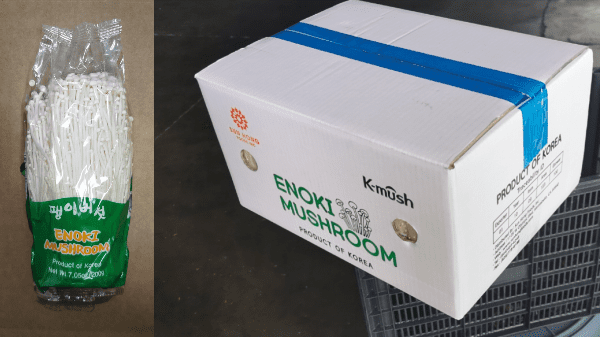The Food and Drug Administration released this information March 18, 2020:
On March 9, 2020, Sun Hong Foods, Inc. BB #:301933 recalled all enoki mushrooms imported from Korea (Republic of Korea). The firm recalled product after the Michigan Department of Agriculture and Rural Development found that a sample of these mushrooms was positive for Listeria monocytogenes.
Enoki mushrooms from Sun Hong Foods were sold in 7.05 oz/200 g clear plastic packaging with a green label; Sun Hong Foods, Inc. is labeled on the back of the packaging underneath the bar code. These products can also be identified by the UPC code: 7 426852 625810. Recalled product was sold to distributors in California, Florida, Illinois, Oregon, and Texas; and was sold to the following retailers: J&L Supermarket, Jusgo Supermarket, ZTao Market, New Sang Supermarket, Galleria Market.
This distribution information has been confirmed by the firm, but product could have been distributed further, reaching additional states and retail locations.
Consumers should not eat and should check their refrigerators and throw away any recalled enoki mushrooms from Sun Hong Foods, Inc.
Restaurants and retailers should not sell or serve recalled enoki mushrooms distributed by Sun Hong Foods, Inc.
At this time, high risk groups, including the elderly, people with weakened immune systems or chronic diseases, pregnant women and their newborn babies, should not eat enoki mushrooms from Korea (Republic of Korea), even if they were not part of the Sun Hong Foods, Inc. recall.
Consumers, restaurants, retailers, and high risk groups should discard and not eat, sell, or serve enoki mushrooms if they cannot tell where they came from.
Background
FDA, CDC, and state and local partners are currently investigating a multistate outbreak of Listeria monocytogenes infections linked to enoki mushrooms. Enoki mushrooms are a long thin white mushroom, usually sold in clusters. They are especially popular in East Asian cuisine and are also known as enokitake, golden needle, futu, or lily mushrooms.
State and local public health officials interviewed ill people about the foods they ate in the month before they became ill. Twelve out of 22 (55%) reported eating mushrooms, including enoki, portobello, white, button, cremini, wood ear, maitake, and oyster.
Additionally, the Listeria monocytogenes in the enoki mushrooms distributed by Sun Hong Foods, Inc. was determined, by whole genome sequencing, to be a genetic match to the outbreak strain when tested by Michigan Department of Agriculture and Rural Development.
The investigation is ongoing and additional information will be provided as soon as it becomes available.
Case Counts
Total Illnesses: 36
Hospitalizations: 30
Deaths: 4
Illness Onset Date Range: November 23, 2016 – December 13, 2019
States with Cases: AZ (2), CA (9), FL (2), HI (3), IN (1), KY (1), MA (2), MD (2), MI (1), MO (1), NC (1), NJ (1), NV (1), NY (4), RI (1), TN (1), VA (3)



